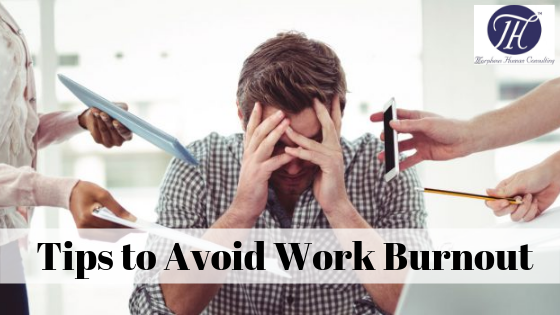Tips to Avoid Work Burnout

Stressed at work? Feeling Exhausted? Unproductive? You may be suffering from burnout.
Recently, the World Health Organisation (WHO) classified ‘work burnout’ as a diagnosable, non-medical condition. What does this mean exactly? Read on to find out.
1. What is work burnout?
According to the World Health Organisation, burnout is characterised as ‘a syndrome conceptualised as resulting from chronic workplace stress that has not been successfully managed’. This is evidenced in three main ways:
- Lacking in energy and feeling exhausted
- Feelings of negativity and distance towards your job
- Reduction in productivity and workplace efficiency
2. What are the burnout symptoms?
It’s normal to feel tired after a long day at work or to feel a moderate level of stress if you have an important project or meeting coming up. So how do you know when the stress you’re feeling is no longer ‘normal’?
If you’re experiencing the following burnout symptoms, you’re likely suffering from this diagnosable condition:
- You are experiencing constant feelings of exhaustion beyond simply feeling tired.
- You have fallen out of love with your job.
- Your productivity level has dropped.
- You have distanced yourself from your colleagues.
- You are easily irritated at work.
- Your physical health may be compromised. For example, you may be experiencing headaches, insomnia, muscle pain or extreme fatigue.
3. How can you tackle it?
-
Pay attention to the signs of burnout
The most important step in dealing with work burnout is to recognise it in the first place. Don’t let it get so bad that it starts to affect all areas of your life. When you start to notice feelings of exhaustion, stress or anxiety, stop what you’re doing. Go take a walk. Get coffee. Talk to a friend. Whatever your method, find a way to remove yourself physically and mentally from the task at hand and take a moment to mentally regroup. If you try to push through, you’ll only end up feeling more burnt out.
-
Stop saying ‘yes’ to things when you should be saying ‘no’
This is a trap that many of us fall into at work. Colleagues, managers and friends all ask for a hand every now and then: tasks, functions, lunch meetings, errands, favours ‒ you name it. And before you’ve even had a chance to think about it, you’ve already agreed to do it. Well, this needs to stop.
Saying ‘yes’ to things you don’t really want to do will only send you another step closer to feeling burnt out. The next time you’re asked to do something, count to three in your head before responding. This will give you those precious few moments to consider whether it’s something you actually want or need to do.
-
Adjust your workload
Burnout is often linked to being overworked. Therefore, if you’re starting to see the signs of burnout, it’s time to take a look at your workload and how you can manage it better. This might mean having a conversation with your manager about their expectations, asking a colleague to assist with a project or declining invites to meetings you don’t really need to attend.
Similarly, if you feel like you need to get away from your desk for an hour or two, take your laptop and go sit in a quiet area in the building. Colleagues won’t be able to find you to interrupt you with questions, you’re away from the phone and you will be able to work through your tasks in a quiet, peaceful space. You can even block out an hour or two in your calendar so that nobody else can schedule a meeting with you during that time. This will ensure you have a few hours every day to get work done without being interrupted.
These tips may not solve the issue of work burnout altogether, but they may help you manage workplace stress before it goes too far.
-
Take a mental health day
In a growing trend, several companies are now offering a mental health day as part of their employee benefits. This means employees can take a leave day when they are feeling particularly stressed or overwhelmed or simply in need of some time to switch off – without cutting into their annual sick leave.
But even if your company doesn’t offer a mental health day, there are still plenty of reasons why it’s OK to take a day off to cater to your mental health. When you’re feeling burnt out, your productivity drops, you achieve less and it impacts your overall well-being. Therefore, make the smart decision to stay home and focus on yourself.
-
Talk about it
There is a real stigma surrounding mental health, and most people don’t like to talk about it, particularly in the workplace. However, feelings of anxiety, stress and mental exhaustion are commonly found in high-stress, fast-paced work environments. Therefore, don’t feel like you need to bottle it up. Start a dialogue. Talk to a colleague or a supervisor about how you’re feeling. It’s likely that if you’re feeling overwhelmed or overworked, those around you might also be feeling the same.
4. Conclusion
Work burnout is a real thing and yes, it’s conquerable. If work is making you feel anxious, stressed, exhausted or like you’ve got far too much to do in your day, then it’s time to take a step back. You will only be as productive as you feel, so give yourself space and time you need to focus on your well-being and avoid spiralling into the cycle of workplace burnout.